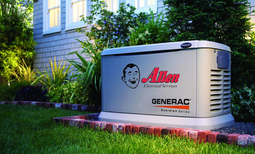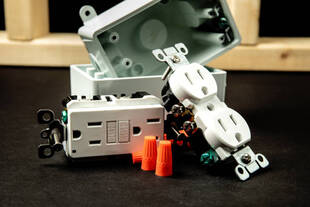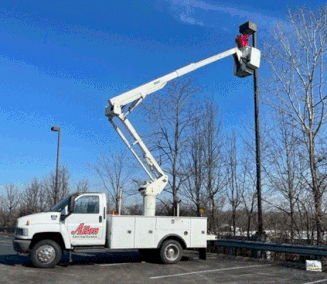1430 Selinda Avenue Louisville, KY. 40213
 When a storm hits, the aftermath can be overwhelming, especially when it comes to dealing with electrical issues. At Allen Electric, we often get questions from our customers about who is responsible for what in these situations. Here’s a clear breakdown to help you understand your responsibilities versus those of Louisville Gas and Electric (LGE). Customer Responsibilities
Stay safe, and remember, Allen Electric is here to light the way through any storm!  "Empowering Homes: The Irrefutable Benefits of Generac Whole Home Generators" In an era where uninterrupted power is not just a convenience but a necessity, Generac Whole Home Generators stand as the beacon of reliability, ensuring that your home remains a sanctuary of comfort and safety even in the face of unexpected power outages. At Allen Electrical, we understand the crucial role these generators play in safeguarding your home and want to shed light on why you need one. Unmatched Reliability Generac has earned its reputation as a leader in residential power solutions, and their Whole Home Generators exemplify this commitment to reliability. Engineered with cutting-edge technology, these generators seamlessly detect power outages and kick into gear within seconds, providing uninterrupted electricity to your entire home. With Generac, you can trust that your lights stay on, appliances keep running, and your home security system remains active. Comprehensive Home Protection Imagine the peace of mind that comes with knowing your entire home is shielded from power disruptions. Generac Whole Home Generators are designed to power all your essential appliances and systems, from refrigerators and HVAC units to medical equipment and security systems. This comprehensive coverage ensures that your family can go about their daily lives without disruption, making it an invaluable investment for your home. Seamless Integration with Your Lifestyle Generac understands that a generator should be an asset, not a burden. That's why their Whole Home Generators are designed for seamless integration with your lifestyle. These generators operate quietly and require minimal maintenance, allowing you to enjoy the benefits of backup power without any hassle. Whether you're at home or away, Generac ensures that your power needs are met effortlessly. Financial Peace of Mind Investing in a Generac Whole Home Generator is not just a practical decision; it's a financial one. Consider the potential costs associated with food spoilage, water damage, and other inconveniences that can arise during a power outage. With a Generac generator, you're not just preventing these expenses but also safeguarding the value of your home and its contents. At Allen Electrical, we believe in providing solutions that enhance the quality of life for our customers. Generac Whole Home Generators embody this philosophy by offering unmatched reliability, comprehensive home protection, seamless integration with your lifestyle, and financial peace of mind. Don't wait until the next power outage to realize the importance of a backup power solution—invest in a Generac Whole Home Generator today and empower your home for a brighter, uninterrupted future! As a homeowner, ensuring the safety of your family and property should always be a top priority. Electrical issues can pose significant risks if not managed correctly. In this blog post, we will discuss ten essential electrical safety tips for your home. By following these guidelines, you can reduce the risk of electrical accidents and maintain a safe living environment.
Upgrading your home to be more energy-efficient is not only beneficial for the environment but can also lead to long-term savings on your energy bills. Fortunately, there are several strategies and initiatives available to help homeowners recoup the costs of these energy-saving upgrades. In this blog post, we will explore how you can recover your investment while transforming your house into an energy-efficient home.
Upgrading your home to be more energy-efficient offers environmental benefits and long-term cost savings. By utilizing rebate programs, tax credits, and energy-efficient mortgage options, you can reduce the financial burden of these upgrades. Additionally, the savings on utility bills and potential increase in property value further contribute to recouping your investment. Embrace energy efficiency and make your home comfortable, sustainable, and financially rewarding. When it comes to your electrical system, selecting the appropriate panel size is crucial for safety and functionality. Whether you're a homeowner or a business owner, understanding the differences between a 100-amp electrical panel and a 200-amp electrical panel is essential. In this blog post, we'll explore the key distinctions between these two panel sizes and help you make an informed decision. If you're in need of professional guidance, contact a reputable residential electrician near you to ensure a safe and efficient electrical setup.
1. Capacity and Power Demand: The capacity of an electrical panel determines its ability to handle electric current flow. A 100-amp panel can safely support up to 100 amps, while a 200-amp panel can handle double that capacity, up to 200 amps. The higher amp rating of a 200-amp panel allows for greater power demand and usage, making it suitable for larger residential properties or commercial applications. 2. Residential Applications: 100-Amp Electrical Panel: For most residential properties, a 100-amp panel is the standard choice. It can effectively handle the electrical needs of an average-sized home, powering essential appliances and lighting circuits. However, if you plan on adding energy-intensive features like electric vehicle chargers, hot tubs, or extensive home office equipment, upgrading to a 200-amp panel may be necessary. 3. Commercial and High-Demand Applications: 200-Amp Electrical Panel: A 200-amp panel is commonly found in commercial buildings or larger residential properties. It provides ample capacity to handle increased power demands, making it suitable for running multiple appliances, heating and cooling systems, and additional electrical equipment. Choosing a 200-amp panel ensures your electrical system is future-proofed and capable of accommodating potential expansions or upgrades. 4. Safety and Peace of Mind: Electrical safety should never be compromised. Selecting the right panel size is crucial for preventing overloading and minimizing the risk of electrical hazards. A 200-amp panel offers a greater safety margin by providing more capacity and reducing the likelihood of circuit overloads and breaker trips. Prioritizing safety is a responsibility that lies with both the homeowner and the electrician working on the project. Conclusion: When it comes to electrical panels, understanding the differences between a 100-amp and a 200-amp panel is vital for making the right choice. A 100-amp panel suits the needs of most residential properties, while a 200-amp panel is better suited for larger homes or commercial buildings with higher power demands. To ensure a safe and efficient electrical setup, consult with an experienced electrician in your area. If you're searching for a residential electrician near you, reach out to reputable professionals who can guide you through the selection and installation process. Prioritize safety and make an informed decision to meet your electrical needs effectively. When installing a hot tub, it's important to ensure that you meet the necessary electrical panel requirements. Here are some key considerations:
|
AuthorAllen Electrical Archives
July 2024
Categories |





 RSS Feed
RSS Feed




7/4/2024
1 Comment